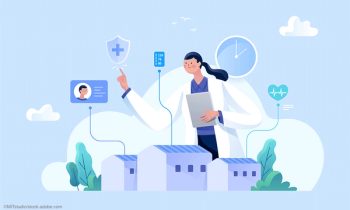
AMA: Residents, Fellows should have PPEs, loan debt forgiven
New guidance issued.
Residents and fellows should have access to personal protective equipment (PPE), have their student loan debt forgiven, and other measures to deal with COVID-19, the American Medical Association (AMA) said in a new guidance.
“Residents should be granted forgiveness and/or forbearance for all or portions of their student loan debt to ease the financial stress they may experience in caring for themselves and their families. This is particularly important during this time of compromised access to opportunities to supplement their income, such as moonlighting,” AMA said in its “Guiding principles to protect residents & fellow physicians responding to COVID-19,”
The residency program guidance is needed to help the more than 135,000 resident and fellow physicians “adequately address the personal, physical and economic stresses that residents and fellows are facing,” the organization said in a
Trending:
“As part of their training, residents and fellows across the country are being heavily relied upon as essential front-line caregivers during the COVID-19 pandemic-often assuming roles that aren’t typical to residency training. It is vitally important that residency programs and sponsoring institutions are taking action to ensure these physicians-in-training are kept safe and supported personally and financially throughout the course of the pandemic,” said AMA President Patrice A. Harris, MD.
In addition to student loan forgiveness, other important measures covered in the guidance include:
- Residents should be candidates for hazard pay in a way that is equitable to other healthcare workers
- Residents must have access to, and instruction in, the use of adequate personal protective equipment (PPE), “as should all health care workers,” AMA said.
- Residents must be free to raise concerns about their personal safety and the safety of those around them without recrimination or consequence to their employment and training.
- Residents must be actively engaged in COVID-19 response planning regarding deployment of health care workers, including field promotion of fellows to attending roles, in order for the specific interests of trainees to be considered.
- Residents deployed to clinical areas with which they are unfamiliar must receive appropriate training and supervision for the tasks they will be asked to perform.
- Residents who become ill as a result of their participation in the COVID-19 response must not be required to use vacation and/or personal time off while ill and/or quarantined. “Residents who require leave under these circumstances must continue to receive their salary and benefits,” AMA said.
- Sponsoring institutions and residency programs must continue to comply with the Accreditation Council for Graduate Medical Education (ACGME) requirement to provide access to confidential, affordable mental health assessment, counseling and treatment, including access to urgent and emergency care 24 hours a day, seven days a week.
- The clinical work that residents perform during the pandemic response must be considered in assessments of a trainee’s qualifications for program completion. “Where possible, credit should be given for the work residents are doing during this time,” AMA said.
- The ACGME review committees (RCs), the American Board of Medical Specialties (ABMS) specialty boards and the American Osteopathic Association (AOA) specialty boards should consider their program and certification requirements, in light of the pandemic, to allow flexibility in assessments of the competence of trainees. Where possible, these assessments should not delay program completion nor eligibility for certification.
- Residents must be permitted to remain in their programs to complete necessary requirements that qualify them for board certification. “They must continue to receive salary and benefits and have access to necessary clinical experiences,” AMA said.
- Fellows who assume attending physician roles in core disciplines in which they are licensed and certified should receive pay and benefits commensurate with these roles. In addition, the impact of this activity on progress toward completion of the training program must be openly discussed with fellows prior to them assuming these responsibilities.
- The Centers for Medicare & Medicaid Services (CMS) should ensure flexibility in GME reimbursements to hospitals to accommodate variations in training due to the COVID-19 response. “This flexibility should lengthen the initial residency period (IRP) for residents to allow them to extend their training, if necessary, to meet program and board certification requirements. In addition, CMS should expand the residency funding cap at institutions where residents must extend their training, in order to support an increased number of residents, as new trainees begin, while existing trainees remain to complete their programs,” AMA said.
“As hospitals and health systems confront the economic impact of the pandemic response, we urge early consideration of effects on the training environment and the sustainability of GME programs,” AMA said. Health systems should also proactively manage opportunities for residents to continue their professional development.
Newsletter
Optimize your practice with the Physicians Practice newsletter, offering management pearls, leadership tips, and business strategies tailored for practice administrators and physicians of any specialty.






